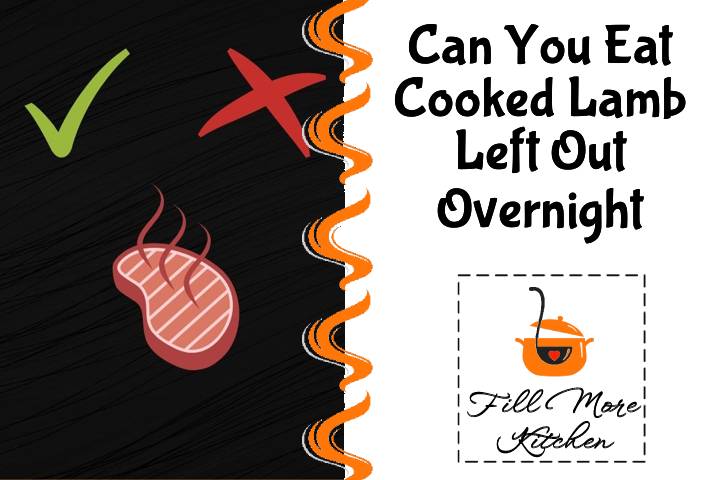Proper storage of lamb is crucial to maintain its safety for consumption, and if there is any uncertainty about the duration it has been left out, it is advisable to dispose of it promptly to avoid jeopardizing the well-being of the individual who consumes it.
Experts recommend not leaving cooked lamb at room temperature for more than two hours. After this time, it is considered spoiled and unfit for consumption, even if it appears visually appealing and lacks any signs of mold or discoloration.
Determining whether or not food has spoiled can be challenging. In this article, we will explore methods for identifying spoilage in cooked lamb, proper storage techniques, and potential consequences of consuming spoiled lamb. Keep reading to learn more.
Why Does Food Go Bad?
Several factors contribute to food spoilage, and the common denominator is that the item becomes unsafe for consumption, regardless of its appearance.
Food can spoil because of various factors such as oxygen, heat, temperature, and bacteria that lead to its decomposition; eventually, most food items will deteriorate over time, although some may do so more slowly than others.
Although it may not always be visible, bacterial growth frequently causes food to spoil.
The taste, smell, and appearance of food can be altered by chemical and physical reactions that occur, often resulting in the growth of fuzzy mold patches.
Meats, dairy products, and fresh ingredients are among the types of food that can spoil more quickly than others.
One can prevent early spoilage of food by storing it in the refrigerator or freezer, which helps to slow down bacterial growth and the eventual deterioration of the item.
It is crucial to package your food correctly in a sealed container and maintain the appropriate temperature range to prevent spoilage from improper storage.
If your home is warm or humid, items such as produce left on the counter may deteriorate more quickly than anticipated.
What Happens If You Eat Lamb That’s Gone Bad?
Consuming spoiled lamb can lead to abdominal problems like cramping, which is a normal reaction to eating bad meat and usually goes away on its own within a short time.
If you consume spoiled lamb, you may encounter symptoms such as vomiting, diarrhea, nausea, and fever. In severe instances, consuming contaminated meat can result in food poisoning that may necessitate medical intervention to address the problem.
Anyone is susceptible to getting food poisoning if they’ve consumed spoiled food, however, some groups of people are more vulnerable than others. This list includes young children, elderly individuals, and pregnant women.
Before consuming meat, it is crucial to inspect it and dispose of it immediately if there is any slimy coating or unpleasant sulphuric odor. However, in case you accidentally consume spoiled lamb, your body will quickly notify you of the error.
If you are worried that you have ingested spoiled meat, it is advisable to start hydrating yourself with fluids to aid in flushing out the toxins from your body.
If you start to develop a high fever, it is advisable to seek medical attention as they can offer faster remedies for the illness compared to over-the-counter products.
How Can You Tell If Lamb Has Gone Bad?
If you’re not familiar with lamb meat, you might be uncertain about how to select a fresh piece for your upcoming meal.
The color of fresh lamb meat can vary from light pink to a darker red, depending on the specific cut being purchased.
It is normal for cooked lamb to have a lighter-colored fat layer, and if the meat is spoiled, the fat may dry out and turn brown instead of its usual light creamy color while also turning grayish in color.
If you observe a grey tinge on the fresh lamb, it is advisable to discard it immediately as cooking it at high heat will not eliminate the bacteria that has already penetrated the meat, making it unsafe to consume.
When you open the packaging, it should be immediately apparent if fresh lamb has gone bad due to its spoiled smell.
If you detect an unpleasant smell from fresh meat, it is a warning sign that should not be overlooked.
If lamb has gone bad, it may emit a foul smell that resembles sulphur or rotten eggs, while fresh lamb typically has a pleasant and grassy aroma that may go unnoticed by inexperienced cooks; additionally, the presence of any slimy film on the meat is an indication of spoilage.
How Should Lamb Be Stored?
If you plan to cook fresh lamb, it is important to consider the timing of your cooking. If you intend to use it within 24-48 hours, storing it in the refrigerator should not cause any spoilage concerns.
If you come across a good deal on fresh lamb but don’t plan to use it soon, freezing the meat is a recommended option to preserve it for future use.
Fresh lamb in the form of chops, steaks, or roasts must not be stored in the refrigerator for more than five days as it can become risky to consume. If you decide to cook it after this period, you need to be cautious.
It is best to keep the lamb in its original packaging from the butcher to prevent it from drying out and absorbing other odors from the fridge that could affect its flavor.
Lamb is a great source of protein and contains many important nutrients, such as iron, vitamin B12, and zinc. When you buy this meat product, it’s only natural that you’d want to store and preserve it properly so that you can savor it as part of a tasty and healthy meal.
How Long Can Lamb Be Stored?
The duration for which your lamb remains edible depends on the storage method you opt for, ranging from 2 days to multiple months. If stored in the freezer, fresh lamb meat can retain its freshness for a considerably extended period.
Ground lamb typically remains fresh for 2-3 days in the refrigerator, while whole lamb pieces, like chops, can last up to 5 days.
If lamb is wrapped individually and stored in a ziplock freezer bag, it can last up to six months in the freezer without getting freezer burn.
Fresh lamb can be refrigerated for up to 3-4 days before it needs to be checked for mold, and if you cook the lamb, it can also be frozen at that point.
When freezing meat or any food, it’s important to label the packaging with the date to keep track of how long it has been frozen.
It is important to tightly seal your lamb whether you are refrigerating or freezing it to prevent the meat from drying out and oxidizing.
Slowing down bacterial growth can aid in preserving cooked lamb for future consumption.
You can also check this video about “Can You Eat Cooked Lamb Left Out Overnight?”
Check out our top 10 reviews!
Related posts
https://fillmorekitchen.com/do-pressure-cookers-make-meat-more-tender/
https://fillmorekitchen.com/how-long-can-you-leave-rice-in-water-before-cooking/
https://fillmorekitchen.com/best-affordable-dehydrator-for-mushrooms-2/
https://fillmorekitchen.com/can-you-eat-chicken-nuggets-left-out-overnight/
https://fillmorekitchen.com/can-you-reheat-food-twice/



